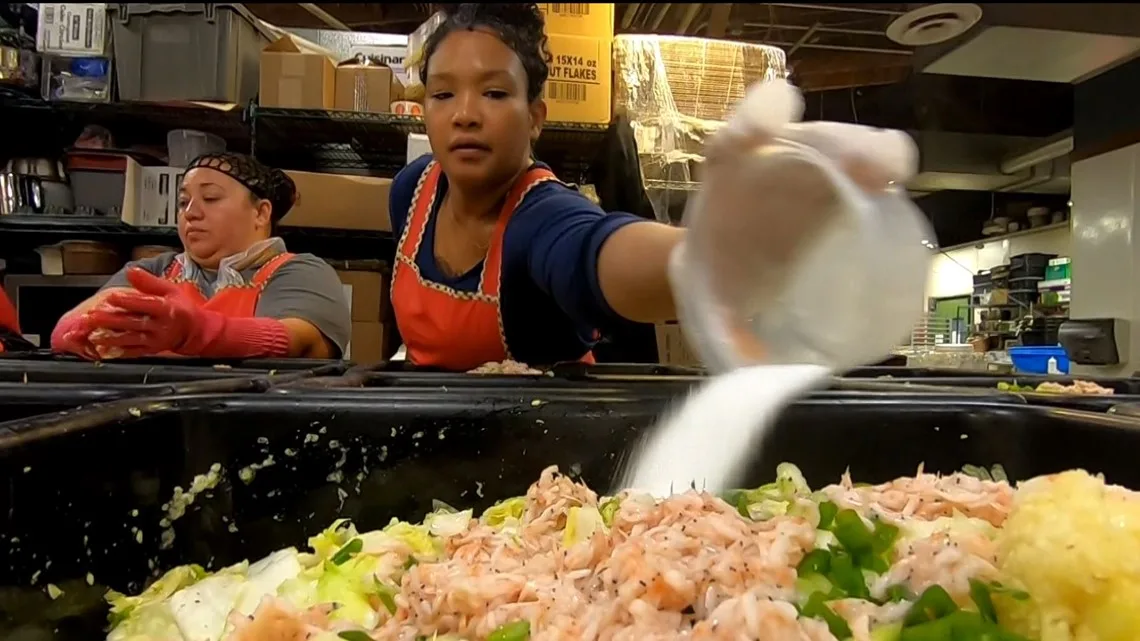
After Patrice Cunningham lost her job as a chef, kimchi became her main focus.
WASHINGTON — The Tae-Gu Kimchi story comes from the heart–of Patrice Cunningham’s childhood home.
“My mom would make me taste every ingredient along the way,” she says of her girlhood memories in D.C. and Prince George’s County. “And so it was a little bit easier for me to become a chef and learn these other techniques and kind of use that in the way I cook now.”
Today, she’s making kimchi for markets, shops, and nationwide shipping–with hopes for continued growth.
Here’s part of our conversation with Cunningham about how she launched the business, lessons she’s learned along the way, and why her kimchi is truly a DC original. (Conversation edited for length and clarity.)
How did you first become interested in cooking?
My memories as a child were always in the kitchen with my mom, her asking me to pass her different ingredients because her hands were full with other things. And she’s like, ‘I need more salt, I need more garlic, I need this, grab that.’ And of course she’s saying these things in Korean. And so I’m learning a little bit of Korean along the process. So as a child it was memories that I really do cherish — in our backyards, mostly, every summer. My mom would make a bunch of kimchi, share it with our neighbors and her friends, and we would stock up.
Growing up cooking in the kitchen with her, you know, that’s where I really learned the basics of things. So when I kind of got into food and became a chef, I really took those like skills that she taught me at a young age and then applied them to more technical things. I learned some French techniques, learned about other cuisines.
So I’ve learned how to really taste food and just really taste the ingredients of it, not masking it with a bunch of different things. And that was just because my mom would make me taste every ingredient along the way. And so it was a little bit easier for me to become a chef and learn these other techniques and kind of use that in the way I cook now. And of course, when it comes to like actually traditional Korean ingredients, you know, I grew up tasting those things from what my mom made. So when I make it myself, I’m comparing it to how good that is. And I’m almost there.
You give out samples of your kimchi varieties at farmers markets; what do you say when people aren’t sure how to use or eat it?
I eat it with my ramen noodles. I’ll have it with my omelet in the morning with some avocado. And that creaminess of the avocado goes super well with the spice. I love making things like kimchi fried rice. You can make kimchi soup, and of course you can make it traditionally. But I’m like, throw some potatoes in there, you know, throw whatever you like in your soup–noodles, whatever it is, throw that in your kimchi. I dig it. I always say there’s no rules, you know. And one of my hashtags is–and it’s on my packaging–“kimchi on everything.” And people are like ice cream. Kimchi on ice cream. I’m like, ‘Hmm, kimchi ice cream.’
Why not?!
Why not? I mean, if you balance that out properly you can get a probably a nice, savory-sweet ice cream.
You hear from customers all the time that this is the best kimchi they’ve ever had. What makes your family recipe different?
Taegu is the city where my mother was born in Korea. So they always say that every region makes kimchi differently. Every family, every household makes their kimchi differently. So Taegu is a little further south. So it has more stronger flavors, in my opinion. We use lots of garlic, lots of fish sauce, lots of shrimp paste. We don’t hold back on the red pepper either. It’s my mother’s authentic recipes. So I learned how to make kimchi from her growing up.
“Tae Gu” is named after your mom’s hometown, but you’re from D.C. and this business is D.C.-based. How have the flavors of D.C. influenced your recipes and your cooking?
My mom is Korean. My dad is African-American. They met when my dad was in the Army in Korea. So they live here actually, in Brookland. And so I grew up in D.C., I grew up in P.G. County as well. So I’m definitely a local.
This area culinary wise, has grown significantly. I mean, when I was a little bit younger, like in college and in high school, even then it was just mostly like take out, fast food stuff. I mean, you had your restaurants, but now we have like Michelin star things here. So, like the food scene has really changed in DC. But I think earlier on when we did have those mom and pops, takeout, there were some of them more run by Korean people making American food. And my mom also had a friend who owned like a fish like joint, so to speak, in DC. And so it would be like fried fish. And she would bring that home and we would enjoy that with Korean side dishes, you know, and rice.
D.C.’s food scene has changed so much. Like right now, it’s a totally different landscape and I love it. I mean, that’s how I really got into wanting to be in the restaurant industry. It’s why I ultimately became a chef. You know, my original goal was to open restaurants at some point, but learning the business, I kind of had a change of heart. But regardless, it’s still something I’m really passionate about. And I say, you know, once I’m rich from kimchi, I want to open a restaurant. I don’t care if it bleeds money. small businesses while you’re coming in in the morning and just the accessibility of a utility kitchen like this.
We’re sitting in Tastemakers, a food court and kitchen-space for small businesses in the D.C. area. Has having a place like this helped you launch?
Oh, my gosh. I mean, I don’t know what other if other cities have this kind of stuff, but I think D.C. is special because, to be able to get a business license, a catering license, to be a cook in D.C., professionally, legally and everything, you have to have a commercial kitchen. But not everyone has a restaurant, you know, and it for a long time it was like, oh, you have to have a brick and mortar commercial space that gets inspected. So this is where places like Tastemakers popped up because they saw that, you know, there’s a lot of culinary professionals that want to open up businesses and things like that. Let’s create a space for them to have that commercial kitchen, get their license, be able to sell their products and food legally. And so being in this environment is great having that opportunity, because otherwise I would never be able to have a business if I didn’t have a commercial kitchen. And so being in this community, especially Tastemakers, is great, because all these different businesses–we support each other.
Tell me why farmers markets are part of your business model and part of where your footprint is.
Originally I had this whole like saying that, ‘Oh, I’m going to start this [consumer packaged good] product, sell my mother’s kimchi recipe, get into all these grocery stores nationwide, become a national brand,’ you know? But then I was like, ‘oops,’ that’s hard, really hard to do. And getting that first grocery store was so intimidating, so scary. I was learning about the business in different ways and learning strategies, learning techniques, but it was just hard to make that first dollar, especially with wholesale, where you get paid 30 days later, 60 days later and things like that. When I lost my job as a chef in the restaurant industry, I decided to do this. I literally had $500 in my bank account from my last paycheck. And with a loan, you know, I was able to get the initial things that I needed. And someone says, ‘start at the farmer’s market,’ and I was like, oh, yeah.
Three years later, we’re operating 16, 17 markets a week. You know, most of them are under Freshfarm, which is a another ecosystem that is just a beautiful space and a lot of opportunity. That’s where I really scaled my business is with Freshfarm. And so you kind of are able to grow as much as you want in that space. And farmers markets in general, it’s just a beautiful thing. And I don’t know what other cities are like with their farmer’s markets, but you can make a big business out of farmer’s markets in this area. You got Virginia, you got Maryland markets, you got all these D.C. markets.
We ship nationwide. And, you know, we’re making our way through the grocery world.
And what’s it like having a business here now?
I was blessed with a grant, a food business grant. And right now, the government and the mayor and everything are really pouring into the local businesses here, especially food, too, because I think it drives the economy. I mean, people we’re a city that goes out. We like to eat, we like to drink. You know, we’re a melting pot from people all over the country here. And so that’s why it’s a reflection of the food, because this is what we want. We want like southern food, we want Italian, we want Korean, we want all these things because we’re coming from all these places. We’re well-traveled here.
What does it mean for you to be rooted here in this community?
I feel so proud. I did move away and I said, ‘Oh, what the heck with D.C. I’m going to go explore something else, D.C. is boring.’ You know, I came back because we really grew as a community, you know. I mean, we have our issues, of course, and we’re working towards it. But I really think D.C. has come a long way in all aspects, and so I feel really proud to be to say I’m a local. Like, that’s my opening line: I’m a Washingtonian.
LOVE WHERE YOU LIVE: HOMEGROWN EDITION
This fall, “Love Where You Live” is paying special attention to our neighbors who keep us fed. Wednesday mornings on Get Up DC, from Oct. 18-Nov. 22, we’ll highlight the region’s makers, growers, and purveyors who share their harvest with the DMV at weekly farmers markets. From a mother-daughter kimchi company putting a new spin on a cultural staple, to a first-generation organic farmer cultivating in all seasons, to a culinary-artist turned pickler—we’ll ask about their process, what keeps them going (and growing), and why the DMV is where they’re rooted. It’s a celebration of what it means to be homegrown in this diverse community, and a closer look at the economic and environmental importance of supporting local.
Each of the businesses profiled in “Love Where You Live: Homegrown” is a vendor at a local FRESHFARM market — a year-round, producers-only community of markets across the DMV featuring farmers and makers from around the Mid-Atlantic.
At nearly 30 markets, shoppers have the opportunity to support local businesses based within 200 miles of Washington, DC. FRESHFARM also supports the local good system through educational programs and food distribution and access programs.
To find a market near you, click here.


